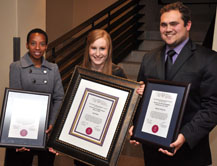 |
Dux students. From the left are Tumelo Moreri, Inge Seale and Werner Pretorius.
Photo: Stephen Collet
8 August 2012 |
Inge Seale, a fifth-year medical student at our university, has been announced as the Student Representative Council of the Bloemfontein Campus’ Dux Student for 2012.
Inge, who excels in a number of fields, has achieved success in academic, leadership, arts and culture, sport and community activities at the university. This includes her role as international co-editor of Impulse, an international undergraduate journal for neurosciences.
Werner Pretorius, a final-year LL.B. student and SRC member: Treasurer was announced as the first runner-up. Tumelo Moreri, a final-year Actuarial Science student and a member of the Golden Key International Honour Society, was the second runner-up.
The Qwaqwa Campus will announce its Dux students later this year.